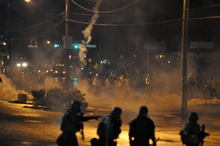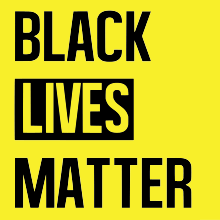Ferguson effect
The Ferguson effect is the theory that increased distrust and hostility towards police can cause officers to engage in less proactive policing, leading to an increase in violent crime rates.[1] The theory was developed after police saw an increase in violence following the 2014 shooting of Michael Brown in Ferguson, Missouri. The term was coined by Doyle Sam Dotson III, the chief of the St. Louis police, to account for an increased murder rate in some U.S. cities following the Ferguson unrest.[2] Data suggests that violent crime was elevated and rose more in cities where concern about police violence was greatest.[3]
Background

The term was coined by St. Louis police chief Sam Dotson in a 2014 column in the St. Louis Post-Dispatch.[4] Dotson said in the column that, after the protests in Ferguson caused by the shooting of Michael Brown that August, his officers had been hesitant to enforce the law due to fears of being charged, and that "the criminal element is feeling empowered" as a result.[2]
The term became popular after Heather Mac Donald used it in a May 29, 2015, Wall Street Journal op-ed.[5] The op-ed stated that the rise in crime rates in some U.S. cities was due to "agitation" against police forces.[6] She also argued that "Unless the demonization of law enforcement ends, the liberating gains in urban safety will be lost", quoting a number of police officers who said that police morale was at an all-time low.[2] In 2015, Rahm Emanuel, the mayor of Chicago, suggested that nationwide backlash against police brutality had led to officers disengaging, which, in turn, had led to violent crime increasing.[7]
In May 2016, FBI Director James Comey used the term "viral video effect" when commenting on significant increases in homicide rates in many large U.S. cities in the first half of the year. Comey specifically singled out the cities of Chicago (where murders were up 54 percent from 2015) and Las Vegas.[8][9][10] The term was also used by Chuck Rosenberg, director of the DEA.[6]
In October 2016, the Ferguson effect was cited in a case in which a Chicago police officer was beaten for several minutes by a suspect but chose not to draw her service weapon, worried of the media attention that would come if she were to shoot the suspect.[11]
Research
Crime
- A February 2016 University of Colorado Boulder study looked at crime statistics from 81 U.S. cities and found no evidence of a Ferguson effect with respect to overall, violent, or property crime, but did identify an increase in robbery rates after the shooting of Michael Brown (while these rates had been decreasing before this shooting). The study concluded that "any Ferguson Effect is constrained largely to cities with historically high levels of violence, a large composition of black residents, and socioeconomic disadvantages."[12]
- A March 2016 study by Johns Hopkins University researchers Stephen L. Morgan and Joel Pally noted a large decline in arrests and a spike in violent crime in Baltimore after the death of Freddie Gray, consistent with a Ferguson effect. However they highlighted certain qualifications and caveats that made it unclear whether the crime spike should be regarded as evidence of a Ferguson effect.[13][14]
- A June 2016 University of Missouri study by Rosenfeld, published by the National Institute of Justice found that there was an "unprecedented" 16.8% increase in homicides in 56 large cities over the course of 2015,[15][16] and examined the Ferguson effect as one of three plausible explanations recommended for further research. Rosenfeld stated that "the only explanation that gets the timing right is a version of the Ferguson effect" and that it is his "leading hypothesis".[17]
- Another 2017 study showed that after the shooting of Michael Brown, police traffic stops declined while hit rates went up on police searches in the state of Missouri. The study found no relationship between changes in police activity and crime rates.[18]
- In 2018, USA Today reported that there had been a sharp increase in Baltimore homicides after the local death of Freddie Grey in April 2015, showing 527 occurring in the three years prior, versus 859 in the three years following; and this was accompanied by police taking an apparent blind eye to ordinary street crime, with a nearly 50% reduction in police reports of spotting potential violations themselves.[19]
- In June 2020, Harvard economist Roland Fryer and Tanaya Devi released a paper showing evidence of the Ferguson effect. Across 5 cities where a viral deadly shooting preceded an investigation into crime and policing, they found that the violent crime rate increased, resulting in an additional 900 homicides and 34,000 excess felonies across 2 years. They suggest this was due to changes in the quantity of policing. Other theories, such as changes in community trust, contradicted the data in key ways. [20]
Negative publicity of police
- According to Vox, "a 1999 study by criminologist Robert Ankony found that when police feel more alienated from, and negatively toward, members of the community, they're more likely to retreat from 'proactive' policing and do only what they need to do to respond to crimes."[1]
- A 2015 study found that the Ferguson effect made police officers less willing to engage in community partnership. The study also suggested that officers who have confidence in their authority and perceive their police department as fair are more willing to partner with their communities, "regardless of the effects of negative publicity".[21]
- A 2016 study by sociologists Matthew Desmond and Andrew V. Papachristos concluded that black people were afraid to call 911 after a heavily publicized violent beating of an unarmed black man by white police officers. After the police beating of Frank Jude in October 2004 was reported in the Milwaukee Journal Sentinel, there was a 17% drop in 911 calls, and a 32% increase in homicides. "Our research suggests that this happened not because the police 'got fetal' but because many members of the black community stopped calling 911, their trust in the justice system in tatters," they wrote.[22][23]
- A December 2016 study found that police deputies who thought their supervisors were more fair were less likely to perceive danger, be unmotivated, or think that civilian attitudes toward the police have become more cynical since the shooting of Michael Brown.[24]
- A 2017 study surveyed officers in a police department in the southeastern U.S., and found that they believed that negative publicity of police negatively affects civilians enough to increase crime rates. The study also found that negative publicity increases officers' perceptions of a police legitimacy crisis and fear of being falsely accused of misconduct.[25]
Criticism
William Bratton, the then-New York City Police Commissioner, said in 2015 that he had seen no evidence of a "Ferguson effect" in his city.[26] U.S. Attorney General Loretta Lynch testified before Congress on November 17, 2015, that there was "no data" to support claims that the Ferguson effect existed.[27] According to Slate, Ronald L. Davis, a former police chief and the executive director of President Obama's Task Force on 21st Century Policing, testified at the same hearing that the notion that police would fail to do their jobs because they were scared was "an insult to the profession".[28]In December 2015, Edward A. Flynn, police chief of Milwaukee, Wisconsin, said that although police were unnerved due to anti-police protests, this was not solely responsible for the increase in violent crime observed in his city recently, because rates of such crimes there started increasing before Michael Brown was shot.[29]
President Obama also said in a 2015 speech to the International Association of Chiefs of Police that although gun violence and homicides had spiked in some U.S. cities, "so far at least across the nation, the data shows that we are still enjoying historically low rates of violent crime", and "What we can't do is cherry-pick data or use anecdotal evidence to drive policy or to feed political agendas."[30]
References
- Lind, Dara (2016-05-18). "The "Ferguson effect," a theory that's warping the American crime debate, explained". Vox. Retrieved 2020-07-30.
- Gold, Ashley (5 June 2015). "Why has the murder rate in some US cities suddenly spiked?". BBC News. Retrieved 15 December 2015.
- Gross, Neil (4/17/2017). "Is There a "Ferguson Effect?" Google Searches, Concern about Police Violence, and Crime in U.S. Cities, 2014–2016". Socius: Sociological Research for a Dynamic World. Check date values in:
|date=(help) - Byers, Christine (15 November 2014). "Crime up after Ferguson and more police needed, top St. Louis area chiefs say". St. Louis Post-Dispatch. Retrieved 15 December 2015.
- Mac Donald, Heather (29 May 2015). "The New Nationwide Crime Wave". Wall Street Journal. Retrieved 15 December 2015.
- Ford, Matt (21 November 2015). "Debunking the Ferguson Effect". The Atlantic. Retrieved 15 December 2015.
- Johnson, Kevin (28 December 2015). "Providence one of many U.S. police forces feeling Ferguson aftershocks". USA Today. Retrieved 8 February 2016.
- "F.B.I. Director Says 'Viral Video Effect' Blunts Police Work". The New York Times. 12 May 2016. Retrieved 8 October 2016.
- "Table 4 – Illinois through Missouri". Retrieved 14 July 2016.
- Sanburn, Josh. "Murders in Major U.S. Cities Are Up Again This Year". Retrieved 14 July 2016.
- Hawkins, Derek (October 7, 2016). "'Ferguson effect'? Savagely beaten cop didn't draw gun for fear of media uproar, says Chicago police chief". Washington Post. Retrieved October 7, 2016.
- Pyrooz, David C.; Decker, Scott H.; Wolfe, Scott E.; Shjarback, John A. (September 2016). "Was there a Ferguson Effect on crime rates in large U.S. cities?". Journal of Criminal Justice. 46: 1–8. doi:10.1016/j.jcrimjus.2016.01.001. Lay summary – University of Colorado Boulder News Center (4 February 2016).
- Morgan, Stephen L. (March 2016). "Ferguson, Gray, and Davis" (PDF). Retrieved 11 April 2016.
- Mock, Brentin (15 March 2016). "Study: There Has Been No 'Ferguson Effect' in Baltimore". Citylab. Retrieved 11 April 2016.
- "Murder Rate Spike Could Be 'Ferguson Effect,' DOJ Study Says". NPR. 15 June 2016.
- Rosenfeld, Richard (2016), Documenting and Explaining the 2015 Homicide Rise: Research Directions (PDF), U.S. Department of Justice, retrieved 15 Jun 2016
- "Is the 'Ferguson effect' real? Researcher has second thoughts". The Guardian. 13 May 2016.
- Shjarback, John A.; Pyrooz, David C.; Wolfe, Scott E.; Decker, Scott H. (May 2017). "De-policing and crime in the wake of Ferguson: Racialized changes in the quantity and quality of policing among Missouri police departments". Journal of Criminal Justice. 50: 42–52. doi:10.1016/j.jcrimjus.2017.04.003.
- Heath, Brad (12 July 2018). "Baltimore police stopped noticing crime after Freddie Gray's death. A wave of killings followed". Baltimore.
- https://www.nber.org/papers/w27324.pdf
- Wolfe, Scott E.; Nix, Justin (2015). "The Alleged 'Ferguson Effect' and Police Willingness to Engage in Community Partnership". Law and Human Behavior. 40 (1): 1–10. doi:10.1037/lhb0000164.
- Why Don’t You Just Call the Cops? By Matthew Desmond and Andrew V. Papachristos. New York Times, Sep. 30, 2016
- Desmond, Matthew; Papachristos, Andrew V.; Kirk, David S. (2016). "Police Violence and Citizen Crime Reporting in the Black Community". American Sociological Review. 81 (5): 857–876. doi:10.1177/0003122416663494.
- Nix, Justin; Wolfe, Scott E. (December 2016). "Sensitivity to the Ferguson Effect: The role of managerial organizational justice". Journal of Criminal Justice. 47: 12–20. doi:10.1016/j.jcrimjus.2016.06.002.
- Nix, Justin; Pickett, Justin T. (2017). "Third-person perceptions, hostile media effects, and policing: Developing a theoretical framework for assessing the Ferguson effect". Journal of Criminal Justice. 51: 24–33. doi:10.1016/j.jcrimjus.2017.05.016.
- Perez, Evan (26 October 2015). "FBI chief tries to deal with the 'Ferguson effect'". CNN. Retrieved 15 December 2015.
- Horwitz, Sari (17 November 2015). "Attorney General: There is 'no data' backing existence of a 'Ferguson effect'". Washington Post. Retrieved 15 December 2015.
- Neyfakh, Leon (20 November 2015). "There Is No Ferguson Effect". Slate. Retrieved 8 January 2016.
- Fears, Darryl (5 December 2015). "In Milwaukee, evidence is weak for the 'Ferguson effect'". Washington Post. Retrieved 16 January 2016.
- Eilperin, Juliet (27 October 2015). "Obama says there's no evidence of a 'Ferguson effect'". Washington Post. Retrieved 15 December 2015.
